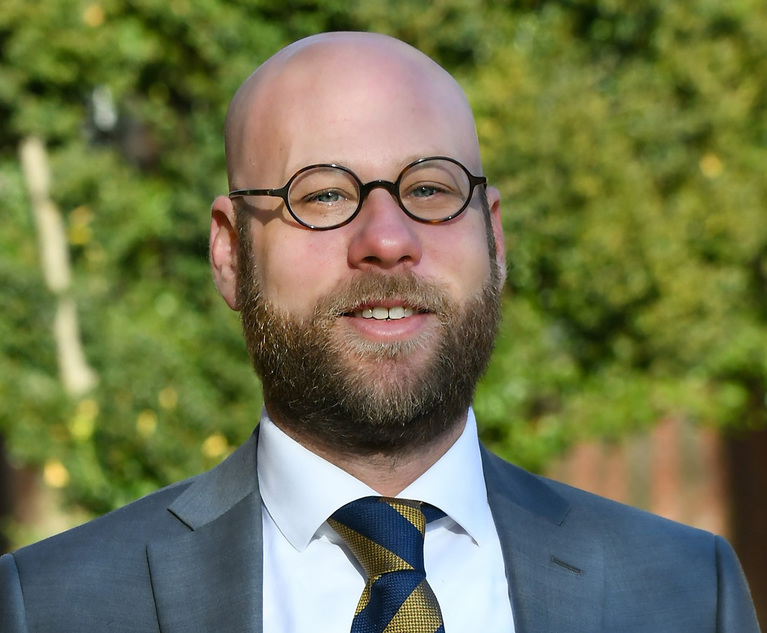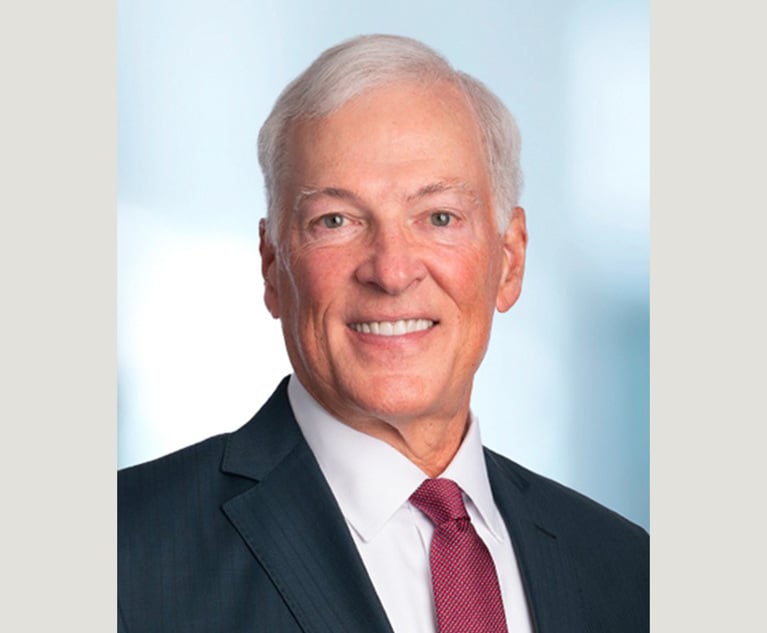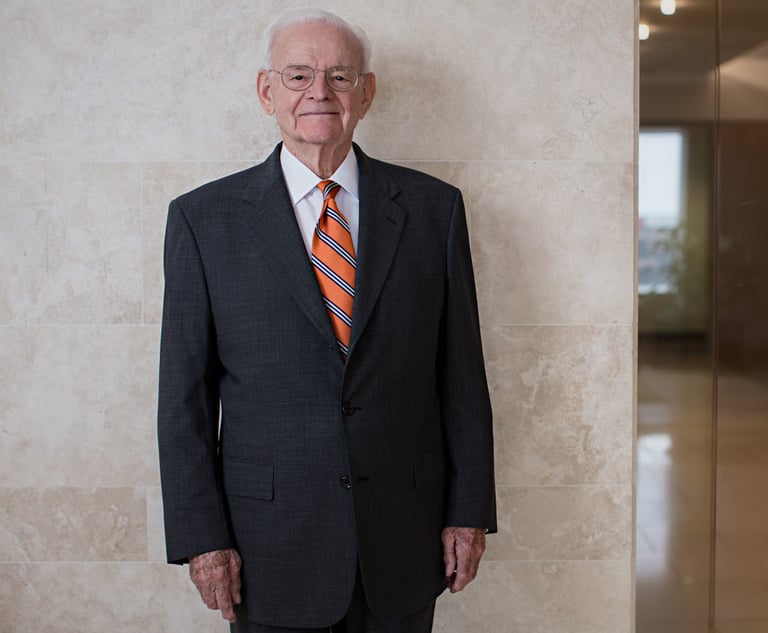 Philadelphia Court of Common Pleas candidate Wade Albert. Courtesy photo
Philadelphia Court of Common Pleas candidate Wade Albert. Courtesy photo Wade Albert Runs for Philadelphia Court of Common Pleas
'I have learned firsthand the awesome power that lawyers and judges have to affect the lives of the actual parties in their cases and what it means for people in those cases to have their voices heard. I understand that what happens at a 30-minute hearing could impact a person for the rest of their life.'
April 05, 2023 at 11:16 AM
6 minute read
Candidate: Wade Albert
Court: Philadelphia Court of Common Pleas
Party: Democrat
Philadelphia Bar Association rating: Recommended
Ballot position: 11
The following has been edited lightly for length and style.
The Legal Intelligencer: Tell us about your background, where you went to law school, what firms you have practiced at, and areas of law you focus on.
Wade Albert: I am a lifelong resident of Philadelphia. I grew up in the Castor Gardens section of Northeast Philadelphia, and have lived in Center City since college. I went to Central High School. I then earned my bachelor of arts from Temple University in political science and classics. After that, I earned my juris doctor from Temple University Beasley School of Law.
Professionally, I practice at Stevens & Lee, where I am a member of the labor and employment group. I primarily litigate employment discrimination and wage claims. I also have side practices in the areas of zoning and election law. I previously practiced at Sobol Law Group, and before that at Sidkoff, Pincus & Green, which is a plaintiff-side litigation boutique.
I am a gay man. I hope to join a small but growing number of LGBTQ+ judges in Pennsylvania.
The Legal: What is one major thing about your career experience that most qualifies you for this position, and why?
Albert: I believe that some of my earliest legal experience most qualifies me to be a judge. After law school, I clerked for [U.S. District Judge] Nitza Quinones Alejandro [of the Eastern District of Pennsylvania] for four years. While in law school, I served as intern law clerk for [Judge] Sandra Mazer Moss [of the Philadelphia Court of Common Pleas] for one year.
These experiences provided me with a deep understanding of the inner workings of the court system and the difficult decisions that judges have to make every day. For example, during the time I clerked for Quinones, she presided over 150 civil jury trials (mostly medical malpractice, products liability and government liability cases), and ruled on over 1,000 pretrial and posttrial motions. I worked closely with her. She trained me to view cases and legal issues from multiple angles in order to reach fair, reasoned decisions. She also showed me how to run a courtroom and how to manage a jury.
The Legal: What is the main reason Pennsylvania voters should pick you?
Albert: Voters should pick me for judge on the Philadelphia Court of Common Pleas because of my experience as an attorney and extensive history of public service. With regard to experience, I worked behind the scenes for the court system and practiced law on both the plaintiff and defense sides.
During my career as an attorney, I also have performed countless hours of pro bono work. For example, I participated in and ran several annual expungement clinics for an organization called Unity in the Community, for which I helped low-income Philadelphians clear their old criminal records. For this work, the Philadelphia Court of Common Pleas, Criminal Trial Division, awarded me the Pro Bono Publico Award in 2019. This award is given to only one attorney, law firm or legal aid organization each year.
In addition, I have worked hard to improve the community. Among other things, I previously served as president of the Center City Residents' Association, my neighborhood civic association. I was vice chair of the Crosstown Coalition, which is essentially a consortium of civic associations throughout Philadelphia. I also served on the boards of the Liberty City LGBTQ+ Democratic Club and Philly Set Go.
The Legal: What will be your approach to moving matters efficiently through the case management system?
Albert: As an attorney in civil practice, I understand that there is a significant backlog in the court system. There was a backlog before the pandemic. The backlog is worse now. Having cases languish on the docket disserves litigants and wastes the resources of everyone involved.
At the same time, the overwhelming majority of civil cases ultimately settle. But as we all know, cases rarely settle without some sort of court intervention—such as a compulsory settlement conference or a hard trial date on the horizon.
Within available resources, I would explore ways to increase opportunities for successful early mediation. For example, state courts in New Jersey regularly require parties to attend mediation at an early juncture in the case, often around the time when written discovery is completed and depositions are just beginning. In contrast, cases in Philadelphia often are not called for a settlement conference until a later procedural juncture. If elected to the bench, I would hope to get the opportunity to help litigants get to the negotiation table as early as practicable.
The Legal: What would you say to voters regarding your plans to ensure the equal administration of justice for all people?
Albert: I fundamentally understand the importance of access to justice and due process for all litigants, regardless of whether they represented by the most competent of counsel or are proceeding pro se—and everything in between. Over the years, I have taken on many pro bono cases for individuals who cannot afford to hire a lawyer, and I have litigated cases against pro se opponents. Through these experiences, I have learned firsthand the awesome power that lawyers and judges have to affect the lives of the actual parties in their cases and what it means for people in those cases to have their voices heard. I understand that what happens at a 30-minute hearing could impact a person for the rest of their life. I would treat court proceedings as the solemn and serious events that they are and treat all parties before me with the dignity and respect that they deserve as fellow humans.
Relatedly, my experience working in the area of employment law has provided me with a profound awareness of how discrimination and implicit bias impact people in so many different ways—including in the justice system. I would bring that experience with me into the courtroom and be vigilant not to prejudge anyone.
The Legal: Where can voters go for more information about you?
Albert: I invite voters to go to my website, wadealbertforjudge.com, to learn more about me and my campaign.
NOT FOR REPRINT
© 2025 ALM Global, LLC, All Rights Reserved. Request academic re-use from www.copyright.com. All other uses, submit a request to [email protected]. For more information visit Asset & Logo Licensing.
You Might Like
View All
Superior Court Directs Western Pa. Judge to Recuse From Case Over Business Ties to Defendant
3 minute read
Saxton & Stump Lands Newly Retired Ex-Chief Judge From Middle District of Pa.
3 minute read
'Discordant Dots': Why Phila. Zantac Judge Rejected Bid for His Recusal
3 minute read
Judge Louis C. Bechtle: An American Jurist Who Relied on Common Sense, Sound Judgment and Fairness
5 minute readLaw Firms Mentioned
Trending Stories
- 1Uber Files RICO Suit Against Plaintiff-Side Firms Alleging Fraudulent Injury Claims
- 2The Law Firm Disrupted: Scrutinizing the Elephant More Than the Mouse
- 3Inherent Diminished Value Damages Unavailable to 3rd-Party Claimants, Court Says
- 4Pa. Defense Firm Sued by Client Over Ex-Eagles Player's $43.5M Med Mal Win
- 5Losses Mount at Morris Manning, but Departing Ex-Chair Stays Bullish About His Old Firm's Future
Who Got The Work
J. Brugh Lower of Gibbons has entered an appearance for industrial equipment supplier Devco Corporation in a pending trademark infringement lawsuit. The suit, accusing the defendant of selling knock-off Graco products, was filed Dec. 18 in New Jersey District Court by Rivkin Radler on behalf of Graco Inc. and Graco Minnesota. The case, assigned to U.S. District Judge Zahid N. Quraishi, is 3:24-cv-11294, Graco Inc. et al v. Devco Corporation.
Who Got The Work
Rebecca Maller-Stein and Kent A. Yalowitz of Arnold & Porter Kaye Scholer have entered their appearances for Hanaco Venture Capital and its executives, Lior Prosor and David Frankel, in a pending securities lawsuit. The action, filed on Dec. 24 in New York Southern District Court by Zell, Aron & Co. on behalf of Goldeneye Advisors, accuses the defendants of negligently and fraudulently managing the plaintiff's $1 million investment. The case, assigned to U.S. District Judge Vernon S. Broderick, is 1:24-cv-09918, Goldeneye Advisors, LLC v. Hanaco Venture Capital, Ltd. et al.
Who Got The Work
Attorneys from A&O Shearman has stepped in as defense counsel for Toronto-Dominion Bank and other defendants in a pending securities class action. The suit, filed Dec. 11 in New York Southern District Court by Bleichmar Fonti & Auld, accuses the defendants of concealing the bank's 'pervasive' deficiencies in regards to its compliance with the Bank Secrecy Act and the quality of its anti-money laundering controls. The case, assigned to U.S. District Judge Arun Subramanian, is 1:24-cv-09445, Gonzalez v. The Toronto-Dominion Bank et al.
Who Got The Work
Crown Castle International, a Pennsylvania company providing shared communications infrastructure, has turned to Luke D. Wolf of Gordon Rees Scully Mansukhani to fend off a pending breach-of-contract lawsuit. The court action, filed Nov. 25 in Michigan Eastern District Court by Hooper Hathaway PC on behalf of The Town Residences LLC, accuses Crown Castle of failing to transfer approximately $30,000 in utility payments from T-Mobile in breach of a roof-top lease and assignment agreement. The case, assigned to U.S. District Judge Susan K. Declercq, is 2:24-cv-13131, The Town Residences LLC v. T-Mobile US, Inc. et al.
Who Got The Work
Wilfred P. Coronato and Daniel M. Schwartz of McCarter & English have stepped in as defense counsel to Electrolux Home Products Inc. in a pending product liability lawsuit. The court action, filed Nov. 26 in New York Eastern District Court by Poulos Lopiccolo PC and Nagel Rice LLP on behalf of David Stern, alleges that the defendant's refrigerators’ drawers and shelving repeatedly break and fall apart within months after purchase. The case, assigned to U.S. District Judge Joan M. Azrack, is 2:24-cv-08204, Stern v. Electrolux Home Products, Inc.
Featured Firms
Law Offices of Gary Martin Hays & Associates, P.C.
(470) 294-1674
Law Offices of Mark E. Salomone
(857) 444-6468
Smith & Hassler
(713) 739-1250





